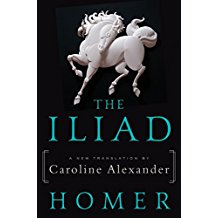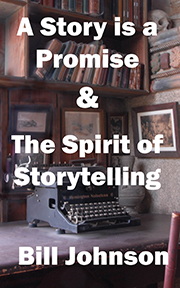|
|
| About the Author |
Story Structure and Ancient Oral Storytelling
Notes on Homer's The Iliad
by Bill Johnson 
I recently came across an online discussion about storytelling. One person stated that while a current understanding of story structure could be applied to modern stories, it could not be applied to ancient, oral epics. What follows will be my breaking down the opening text in a translation of Homer's The Iliad (translation by Caroline Alexander, Ecco; Reprint edition (November 24, 2015). Aristotle praised The Iliad in his Poetics for its unity. There are many translations of The Iliad; I picked one I enjoyed.
Book One, first word: Wrath.
The enduring conventional wisdom of storytelling is that you tell a story by withholding information. Popular stories, and here, Homer in the Iliad, do the opposite. Homer lets us know, first word of the story, that this is a story about wrath. Pick up a hugely successful novel and the opening words will convey something about the story. That is true now, it was true in Homer's time.
Continuing...
Wrath-sing, goddess, of the ruinous wrath of Peleus' son Achilles
This conveys a main character who drives the action with his wrath, Achilles.
Continuing...
that inflicted woes without number upon the Achaeans
hurled forth to Hades many strong souls of warriors
and rendered their bodies prey for the dogs, for all birds
We learn here a consequence of wrath; to learn more, we have to keep reading (or listening, in the time of Homer).
In our culture, leaving fallen warriors to be ravished by dogs and birds is a sign of defeat. In the U.S. the work of identifying and bringing home the remains of dead soldiers from both world wars, Korea, and Vietnam continues to the present. Consider the response you would get in America if you suggested its fallen soldier were being consigned to Hades. This type of language is designed to evoke a tremendous emotional reaction in the audience.
Immediately grabbing your readers by the heart and squeezing; it's a time-tested method to engage attention.
Continuing...
and the will of Zeus was accomplished
Zeus is the most powerful god in the Greek pantheon. He ensures that fate is fulfilled. This raises the question, what happens in this story that pulls on the attention of Zeus?
Continuing...
sing from when they two first stood in conflict- Atreus' son, lord of men, and
godlike Achilles.
Atreus' son is Agamemnon. He leads the Greeks against Troy to help his brother, Menelaus of Sparta, to regain his wife, Helen, who has escaped to Troy with her lover, Paris. The opening lines of The Iliad introduces that the two main characters are in a state of conflict that will lead to many deaths.
Establishing a story's promise provides a context that allows readers/viewers to assign meaning to action and characters.
Continuing...
Which of the gods, then, set these two together in conflict, to fight? Apollo, son
of Leto and Zeus; who in his rage at the king raised a virulent plague through the
army; the men were dying because the son of Atreus dishonored the priest
Chryses.
This brings into the story the god Apollo, and suggests that the plague happened because of the actions of Agamemnon.
I call this process question, answer, question. We are told of a plague, then we get the answer to who caused the plague (Apollo), which raises the question, what did Agamemnon do to raise the wrath of Apollo? This question, answer, question process conveys to the readers/audience of a story that questions will be answered.
A great example of the question, answer, question process in a film are the opening scenes from The Usual Suspects.
Continuing...
For he came to the Achaeans' swift ships bearing countless gifts to ransom his
daughter, holding in his hands on a golden staff the wreaths of Apollo who strikes
from afar, and beseeched all the Achaeans- but mostly the two sons of Atreus,
marshalers of men: "Sons of Atreus and you other strong-greaved Achaeans, may
the gods who have homes on Olympus grant you to plunder the city of Priam, and
reach your home safely; release to me my beloved daughter, take instead the
ransom, revering Zeus' son who strikes from afar-Apollo."
This offers details about what the priest asks for, and the threat that Apollo would strike the Greeks if they refuse his plea. This conveys that the plea is refused and Apollo will strike with the plague.
This highlights the question, what does this have to do with Achilles? What generates his wrath?
Continuing...
Then the rest of the Achaeans all shouted assent, to respect the priest and accept
the splendid ransom; but this did not please the heart of Atreus' son Agamemnon,
and violently he sent him away and laid a powerful warning upon him: "Let me
not find you, old man, near our hollow ships, either loitering now or coming again
later, lest the god's staff and wreath not protect you. The girl I will not release;
sooner will old age come upon her in our house, in Argos, far from her
homeland, pacing back and forth by the loom and sharing my bed. So go, do not
make me angry, and you will return the safer."
This conveys what kind of ruler Agamemnon is. He puts the lives of others at grave risk to take a beautiful young girl to bed.
Continuing...
Thus he spoke; and the old man was afraid and obeyed his word, and he went in
silence along the shore of the tumultuous sea. And going aside, the old man
fervently prayed to lord Apollo, whom lovely-haired Leto bore: "Hear me, God of
the silver bow, you who stand over Chryse and Killa most holy, you whose might
rules Tenedos, God of Plague; if ever I roofed over a temple that pleased you, or
if ever I burned as sacrifice to you the fatty thighbones of bulls and of goats-
grant me this wish: May the Danaans pay for my tears with your arrows."
Thus he prayed, and Phoebus Apollo heard him, and set out from the heights of
Olympus, rage in his heart, with his bow on his shoulders and his hooded quiver;
the arrows clattered on his shoulders as he raged, as the god himself moved; and
he came like the night.
Note here how quickly the action advances, from threat to actual response. The audience doesn't have to wait to find out what Apollo will do. This kind of immediate action can also be found in Shakespeare's Romeo and Juliet.
This is what creates the wrath that Achilles feels toward Agamemnon, that leads to a rupture that puts at risk the conquest of Troy.
All very, very dramatic and certain to hold the attention of an audience spellbound.
In screenwriting, this opening would be described as an inciting incident.
Homer is truly revered as one of the great storytelling of the ages.

Copyright 2018-2023 Bill Johnson
